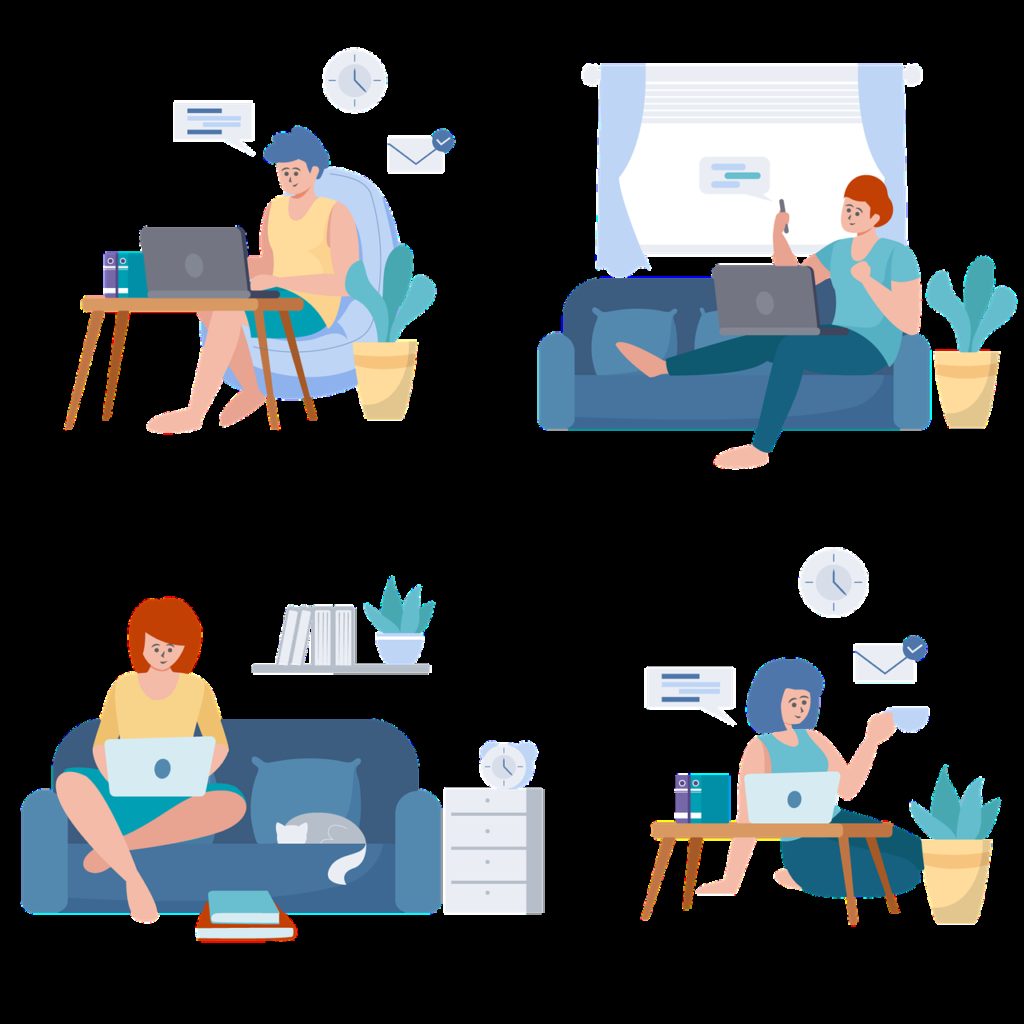The Impact of Remote Work on Home Life
March 2020 was a turning point for so many of us. With little preparation, a majority of office workers and students stepped away from their familiar work-spaces and were sent home until further notice.
During this unprecedented time, the news reports raged on with stories about the growing number of COVID-19 cases, deaths, restrictions, safety practices, and who was to blame for all of this. In addition, stay at home orders required students, workers, administrators, and employers to figure out how to continue business and fulfill responsibilities without an office or classroom.
Of course, there is a sizable portion of workers that simply were not provided this option as they either lost their jobs or were required to attend work in person during this global pandemic. Even though these workers are not the focus of this particular post, I would like to take a moment to express genuine gratitude to those emergency workers, first responders, healthcare workers, retail/grocery store workers, and so many others in the service industry that have worked tirelessly without the opportunity to do it from home. Thank you for all that you have done and continue to do.
After a few challenging months, many organizations, schools, and businesses were able to generate new ways to run operations remotely. Employees and students were now able to work and learn from home which triggered the largest boom of online remote work in human history!
So, what does this mean for workers and students going forward?
For the intended purpose of this post, “work” will refer to all school, business, paid, and unpaid related tasks that traditionally occurred elsewhere (outside the home) but have now shifted to a remote model. With that being said, there are many thoughts to cover when discussing “work from home”, however, there are two major questions I would like to highlight, which are: “what happens when home becomes your office ?” and “is there any going back?”

Work-Life Balance
I think it is fair to say that when you are no longer working from the office, the line between home and work life becomes blurred. You may have noticed…let’s say coworkers, that now attend virtual team meetings in sweatpants from their kitchen. Perhaps at times a four legged friend decides to make themselves known on camera or a child in the background voices their opinion during a video conference. Trust me, with remote work, there isn’t a shortage of humorous video clips that can be found online!
When home becomes the office, there certainly are benefits and challenges. Flexibility with scheduling, ability to skip the commute, and running errands/completing chores during breaks can be a huge plus. However, this trade off may result in a loss of separation from work life and home life.
Boundaries may become compromised as you are now “working from home” or in other words, “living at work”. You may find it challenging to not check emails multiple times throughout the day or feel obligated to respond to messages immediately or outside of traditional work hours. You may even miss the commute that served as a transition period between work and home.
Increased Connection or Feelings of Isolation?
Do remote workers feel more isolated or connected? In terms of online activities and communication, you may find yourself responding and initiating social interactions more than ever. Phone calls, video conferences, chat and email messages come your way throughout the day which serves as a viable way to conduct business. From this perspective, it can be argued that through technology, we are more connected than ever.
On the other hand, you may feel this is a lonely experience. You may find yourself troubled by the idea of not seeing team members/classmates in person. There are no spontaneous gatherings or office drop ins. In addition, there’s less nonverbal communication occurring which can limit meaningful interactions. You may find it to be more difficult to read how others are feeling or respond to certain topics.
Conversations in general may seem more streamlined or oddly paced as you typically share video calls with others that are attempting to interject during discussions. There is usually complete silence after a question is raised or 4 people attempting to speak at once!
You may also easily find yourself shifting attention to other things in your home environment or online that seem more interesting in the moment. Maybe you are noticing that car alarm outside that has been going off for a few minutes!
These social dynamics can certainly apply to client and customer interactions. It may impact satisfaction on the side of the consumer while potentially decreasing feelings of fulfillment for the employee when assisting others.
Staying Focused
As previously mentioned, it may be easy to find yourself more interested in other things in your environment or online. Maintaining focus can be especially difficult while using various devices and tech to conduct work.
It is not uncommon to hear that today’s remote workers are multi-tasking while using their tablets, laptops, and smart phones. They may also be tuning in to the news or attempting to make lunch for their kids! This level of divided attention can generate high level stress and can lead to errors with serious implications.
If you have an environment at home that you find particularly peaceful and demonstrate strong boundaries, perhaps your focus is not an issue. You may find it easier to get work done remotely since you can avoid getting interrupted by coworkers that want to chat or ask a question. In fact, recent studies show that remote work can lead to increased productivity for workers however, respondents cited higher levels of stress and feelings of isolation.

Self Esteem
How does working from home make you feel? Do you feel like you have been able to manage a solid work-life balance ? Do you feel like work has been more manageable or you are performing at a higher level than before? If you answered “yes”, then great!
If you answered no, then you are not alone.
Many workers that I have raised this topic with have reported increased stress at work and some reported difficulties completing tasks that they once considered simple. Difficulty finding motivation and creativity can take a toll on your performance and also your self perception. Terms such as “burnout” and “Zoom Fatigue ” have become commonly voiced when discussing remote work. It can make you feel less capable to complete responsibilities that are assigned to you.
In psychology, we know that the power of the situation can have a lot of influence over our behaviors, thoughts, and emotions. If you are consistently feeling down or overwhelmed, it is important to seek help from a trusted individual or trained professional.
Is There Any Going Back?
Due to the pandemic, schools and businesses have learned to utilize online programs that have allowed them to function to remotely if needed. These organizations will now need to decide what does this mean for operations going forward? Will remote work remain an option for workers or will it become the norm?
Purely as an educated guess, it seems remote work may be here to stay. This is not to say it will completely replace in person work or that workers will never return to the office again but rather organizations will now consider virtual work as an option for their operations or integrate into a hybrid model (some responsibilities on site and some at home).
Virtual work has been shown to have several benefits such as continuing operations without an office, widening the net on talent to recruit, increasing productivity from workers, and saving on physical space/overhead costs.In addition, some school districts and administrators have entertained the idea of discontinuing snow days as work can continue without being physically present in the classroom. There is a good argument for keeping this arrangement in place.
For some jobs, home may remain as a part time office to get work done.
Home just like so many other things will not look exactly the same as it once did before the COVID-19 pandemic. So, does this mean it will be impossible to keep your work from invading your home life? Is having the opportunity to continue to do work at home good or bad?
The answers to these questions will not only depend on the job but also on your personal values, plans, and goals. These will be worth considering when deciding on education and career choices that do or do not have remote work options. In addition, it is imperative to check in with yourself and create boundaries that will contribute to your well-being with whatever you decide.
Remember, working from home is not inherently good or bad but just like so many other things in life, it requires a judgement call on what is right for you and those you care about.
Note to the reader:
If you find yourself struggling with work, please reach out to a mental health professional for assistance. Please see information below for additional mental health resources.
National Suicide Prevention Lifeline: 1-800-273-TALK (8255)
SAMHSA Treatment Referral Helpline: 1-877-SAMHSA7 (1-877-726-4727)
Posted: 4/21/2021
